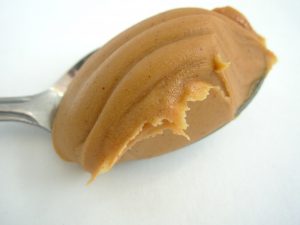Peanut Butter And Your Dog

Peanut butter is a treat we have all given our pups at some point. Whether it be for bribery to take the tablet or as a treat.
The problem is, too much peanut butter can kill your fur baby. This is an issue that is on the rise and has come to light more recently as a result of more and more manufacturers including an ingredient called xylitol in their peanut butter.
Xylitol is harmless to humans and is used throughout the food industry. For years and years the ingredient has been used in sugar-free gums, candy, toothpastes, mouthwash (some research has found that it may be beneficial for dental health), beverages and desserts.

Peanut Butter May Contain Xylitol
That’s all well and good because we won’t be feeding our furry friends any of those food products anyway. However, the presence of xylitol in peanut butter is on the rise and it is deadly for dogs.
Our four-legged friends do not react so well to xylitol. It causes blood glucose levels to drop massively, leading to hypoglycaemia (the same deadly condition diabetics may find themselves in). On top of this, it can also cause liver failure in our pooches.
The key thing is in the amount of xylitol that has been ingested. When dogs ingest large amounts of xylitol, they are more likely to go into liver failure. The worry there is that no one really knows why this happens but ultimately leads to death.
See also: Doggy Diet
Xylitol Can Cause Hypoglycaemia
Even consuming small amounts of this ‘fake’ sugar can cause side effects for your pup. Usually dogs will vomit after eating something containing xylitol. This can then turn into hypoglycaemia in just a 15 minute window. Xylitol triggers the release of insulin into the blood stream (a perfectly normal reaction after eating a meal). However, because Xylitol is a natural sugar with a low GI (Glycaemic Index) it is essentially a ‘fake’ sugar in that it releases slowly whereas most sugars are quick releasing, the insulin release causes your dog to go into a hypoglycaemic state.
Hypoglycaemia in dogs presents with weakness, disorientation, loss of co-ordination, laying down and not being able to get back up and even seizures. The symptoms are fairly similar to those in hypoglycaemic humans.
Dogs can develop dangerous hypoglycaemia from as little as 50 mg/kg. This equates to just half a gram of xylitol for a 10 kg (22 pound) dog. Higher doses are usually required to cause liver failure but death can result from hypoglycaemia alone.
Chewing gum sweetened with xylitol may contain 1 – 2 grams per piece. This means a single piece of this gum could be lethal.
Check the Peanut Butter Label Before Buying
So, what does this mean in peanut butter terms? Well, so far, only some peanut butter brands currently contain xylitol. Most common brands do not YET contain the ingredient but it is best to check the peanut butter tubs for any signs of xylitol. The terms ‘natural sweetener’ or ‘naturally sweetened’ could also be an indication of xylitol presence. An even safer bet is to just not give your dog peanut butter. There are plenty of other snacks out there that can be given to our fur babies without putting them at any risk of health issues. Prevention is far better than treatment!
You may also like this article about 3 reasons peanut butter isn’t safe for dogs or people?
Recommended Posts

Lickimat – 20% OFF
February 27, 2024

Hot weather and your dog
January 05, 2024

Frozen Kong recipes
January 05, 2024
